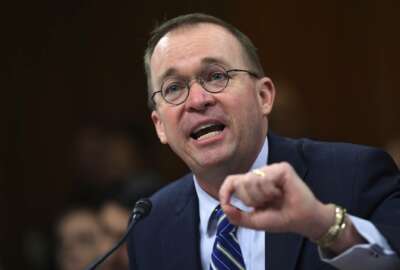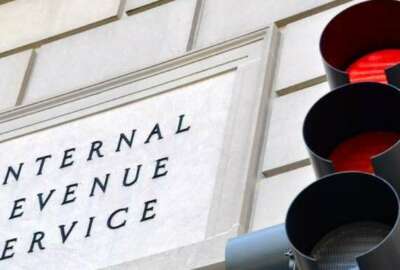
Acting IRS commissioner seeks flexible hiring authority for cyber talent
Acting IRS Commissioner David Kautter called on lawmakers Wednesday to give the agency more flexibility to hire cybersecurity talent from the private sector.
Following the release of President Donald Trump’s fiscal 2019 budget proposal, the acting IRS commissioner called on lawmakers Wednesday to give the agency more flexibility to hire cybersecurity talent from the private sector, and pay them at a rate beyond the pay scale for career employees.
Testifying before the Senate Finance Committee, David Kautter, the acting commissioner of the IRS, called on lawmakers to reauthorize the agency’s streamlined critical pay authority, which would allow the IRS to quickly hire private-sector talent in areas like cybersecurity.
“Streamlined critical pay authority would allow the IRS to hire people in these critical positions in a fraction of the time it would otherwise take, and it would allow us to pay them more than we would otherwise be able to pay under the government pay scale,” Kautter said.
Congress introduced the critical pay authorization in 1998 as part of the IRS Restructuring and Reform Act, but IRS’ authority to make hires under the law expired in September 2013.
Kautter said reauthorizing the critical pay authorization would allow the IRS to compete with Silicon Valley for top cybersecurity talent.
“Under streamlined critical pay [authority], the IRS would be able to bring someone on in six weeks instead of six months, and they could pay someone up to probably up to a third more than they could otherwise pay if they brought them on the general government pay scale. And when you get into the areas of technology and cybersecurity, having that ability to hire somebody in a hurry — I’ve seen the IRS lose people because of the amount of time it takes to get them on board. People that were critical, that really wanted to serve the government,” Kautter said.
Speaking with reporters after the Senate hearing, Jeffrey Tribiano, the IRS deputy commissioner for operations support, told reporters that under the critical pay authorization, only about 40 employees on average have ever been hired under this authority at any time, and traditionally stay for a few years at a time.
Following the hearing, Kautter added that the IRS has only ever hired about 130 people under the critical pay authorization.
In justifying the president’s budget proposal before lawmakers, Kautter said some difficult decisions had to be made. Considering that the IRS defends against more than 2.5 million cyber attacks every day — 1 million of which Kautter described as “sophisticated attacks” — the acting IRS commissioner said President Trump’s FY 2019 budget proposal leans heavily towards investing in cybersecurity.
“Given the increasing number of and sophistication of cyber attacks on the IRS’ systems, and the age of some of its hardware and software, the decision was made to increase the amount of funding going toward technology,” Kautter said.
Citing the passage of the tax reform legislation late last year, Senate Finance Committee Chairman Orrin Hatch (R-Utah) called on the Trump administration to reverse course on cutting funds from the IRS. Since 2010, the agency has lost nearly $1 billion in funding and lost more than 21,000 employees.
“The agency is shedding staff and resources. Agency reductions might be a good thing in some cases, but it should be done through thoughtful reforms, not the blunt axe of blind budget cuts. The administration in its budget has proposed additional cuts to funding for the IRS. I think that is a mistake,” Hatch said.
In order to implement the newly passed tax reform bill, the IRS requested $397 million each year for the next two years. While the Trump FY 2019 budget proposes an increase in IRS enforcement spending, Kautter said enforcement funding has gone down by more than 40 percent since 2010.
“Virtually every category that the IRS audits is down since 2010. Against that backdrop, the budget allocated more money toward operation support and a slight amount more enforcement. That came at the cost of taxpayer assistance,” Kautter said.
Latest Cybersecurity News
Sen. Ron Wyden (D-Ore.), the committee’s ranking member, said the Trump budget proposal, which calls for an increase of $15 billion in enforcement spending over the next 10 years, would probably not make it through to the congressional appropriations process.
“The budget makes a fake reference to increasing enforcement dollars, but it kicks the actual decision to the appropriators to Congress who are unlikely to fork over the necessary resources,” Wyden said.
Meanwhile, the White House calls for cutting more than 4,000 positions from the IRS’ taxpayer services division in the FY 2019 spending plan.
“As a result of continued budget cuts for taxpayer service, fewer than half the people who pick up the phone to call the IRS for filing services in 2019 will get through, down from 75 percent in 2018,” Wyden said.
While Kautter acknowledged the cuts in taxpayer services, he said the IRS will continue investing in online tools for the growing number of taxpayers who file their tax returns electronically.
“At the same time, we recognize the importance of serving the needs of all taxpayers, including those who prefer not to interact with us online, so we will continue our efforts to improve service on all our channels, including in-person and over the phone,” Kautter said.
Copyright © 2025 Federal News Network. All rights reserved. This website is not intended for users located within the European Economic Area.
Jory Heckman is a reporter at Federal News Network covering U.S. Postal Service, IRS, big data and technology issues.
Follow @jheckmanWFED
Related Stories





